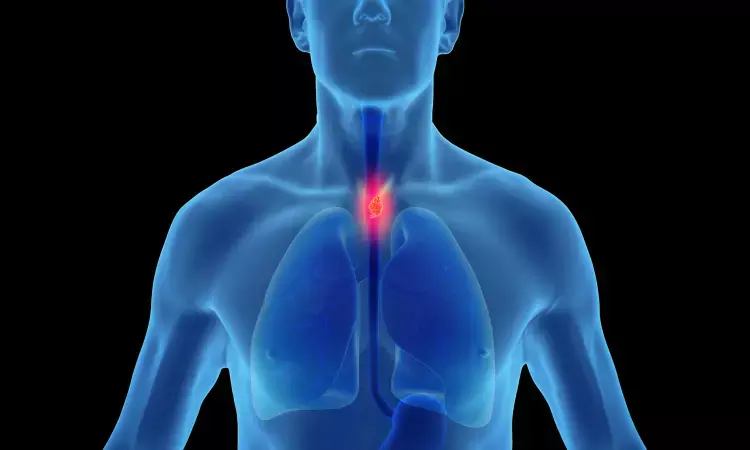- Home
- Medical news & Guidelines
- Anesthesiology
- Cardiology and CTVS
- Critical Care
- Dentistry
- Dermatology
- Diabetes and Endocrinology
- ENT
- Gastroenterology
- Medicine
- Nephrology
- Neurology
- Obstretics-Gynaecology
- Oncology
- Ophthalmology
- Orthopaedics
- Pediatrics-Neonatology
- Psychiatry
- Pulmonology
- Radiology
- Surgery
- Urology
- Laboratory Medicine
- Diet
- Nursing
- Paramedical
- Physiotherapy
- Health news
- Fact Check
- Bone Health Fact Check
- Brain Health Fact Check
- Cancer Related Fact Check
- Child Care Fact Check
- Dental and oral health fact check
- Diabetes and metabolic health fact check
- Diet and Nutrition Fact Check
- Eye and ENT Care Fact Check
- Fitness fact check
- Gut health fact check
- Heart health fact check
- Kidney health fact check
- Medical education fact check
- Men's health fact check
- Respiratory fact check
- Skin and hair care fact check
- Vaccine and Immunization fact check
- Women's health fact check
- AYUSH
- State News
- Andaman and Nicobar Islands
- Andhra Pradesh
- Arunachal Pradesh
- Assam
- Bihar
- Chandigarh
- Chattisgarh
- Dadra and Nagar Haveli
- Daman and Diu
- Delhi
- Goa
- Gujarat
- Haryana
- Himachal Pradesh
- Jammu & Kashmir
- Jharkhand
- Karnataka
- Kerala
- Ladakh
- Lakshadweep
- Madhya Pradesh
- Maharashtra
- Manipur
- Meghalaya
- Mizoram
- Nagaland
- Odisha
- Puducherry
- Punjab
- Rajasthan
- Sikkim
- Tamil Nadu
- Telangana
- Tripura
- Uttar Pradesh
- Uttrakhand
- West Bengal
- Medical Education
- Industry
Dietary modification vital in improving remission rates in Eosinophilic esophagitis

Austria: According to a recent systemic review and meta-analysis, dietary therapy is valuable in treating Eosinophilic esophagitis (EoE). The researchers said that diet modification could be highly beneficial in such patients as it significantly improves remission rates. The study found the overall rate of histologic response as 53.8%.
The findings of the study are published in Clinical Gastroenterology and Hepatology.
EoE is an immune-mediated chronic inflammatory disorder of the oesophagus (eosinophilic infiltration) with symptoms including feeding difficulties, vomiting, dysphagia, and food impaction in children and adults.
The condition is diagnosed by upper endoscopy with biopsies (15 or more eosinophils per HPF) of the oesophagal mucosa.
Treatment includes PPI proton pump inhibitors, topical steroids and diet. Several elimination diet regimens include SFED (6-food elimination diet), FFED (4-food elimination diet), OFED (1-food elimination diet) and TED (targeted elimination diet). Food antigens like dairy, wheat or gluten, eggs, legumes, nuts, and seafood were removed by SFED.
FFED is less restrictive when compared to SFED, so it confers the advantage of increased dietary adherence and life quality. Cow’s milk triggers eosinophilia, so OFED was developed. The detection of triggers for EoE by food allergy testing remains disputed and is poorly correlated to histologic assessment results.
The researchers included 915 children and 847 adults in the meta-analysis. They studied the efficacy rate of four dietary regimens: 6-food, 4-food, 1-food, and a targeted elimination diet in EoE.
The study summary includes the following:
- The researchers searched databases like PubMed, Scopus, and Web of Science.
- There were 1762 patients in 34 studies.
- The histologic remission rate was 53.8%. For SFED, FFED, OFED and TED, the values were 61.3%, 49.4%, 51.4%, and 45.7%.
- Dietary regimen and age did affect rates of histologic remission in a significant manner.
- For clinical response, the overall rate was 80.8%.
- The response rate for SFED, FFED, OFED and TED was 92.8 %, 74.1 %, 87.1 % and 69 %.
In our systematic review and meta-analysis, we updated the current understanding of EoE dietary therapies and compared SFED, FFED, OFED, and TED for their efficacy.
The study's strength was an updated summary of literature with a large cohort, analysis precision and high data reliability. The limitations include potential risk for bias, incomparable subgroups, no reliable data on patient compliance, etc.
Diet therapy can manage E0E of any age. The present study highlights less-restrictive dietary regimens as a primary option. The researchers said,” Our review suggests that dietary therapy is an effective strategy with an overall histologic remission rate of 53.8%.”
Further reading:
Mayerhofer, Christoph, et al. “Efficacy of Elimination Diets in Eosinophilic Esophagitis: A Systematic Review and Meta-Analysis.” Clinical Gastroenterology and Hepatology, Elsevier BV, Jan. 2023. Crossref, https://doi.org/10.1016/j.cgh.2023.01.019.
BDS, MDS in Periodontics and Implantology
Dr. Aditi Yadav is a BDS, MDS in Periodontics and Implantology. She has a clinical experience of 5 years as a laser dental surgeon. She also has a Diploma in clinical research and pharmacovigilance and is a Certified data scientist. She is currently working as a content developer in e-health services. Dr. Yadav has a keen interest in Medical Journalism and is actively involved in Medical Research writing.
Dr Kamal Kant Kohli-MBBS, DTCD- a chest specialist with more than 30 years of practice and a flair for writing clinical articles, Dr Kamal Kant Kohli joined Medical Dialogues as a Chief Editor of Medical News. Besides writing articles, as an editor, he proofreads and verifies all the medical content published on Medical Dialogues including those coming from journals, studies,medical conferences,guidelines etc. Email: drkohli@medicaldialogues.in. Contact no. 011-43720751


